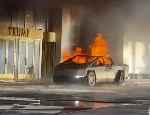Israel-Hamas war: Recovered bodies show 'bloodthirsty' gunmen 'took time over torture' - and that Hamas has changed
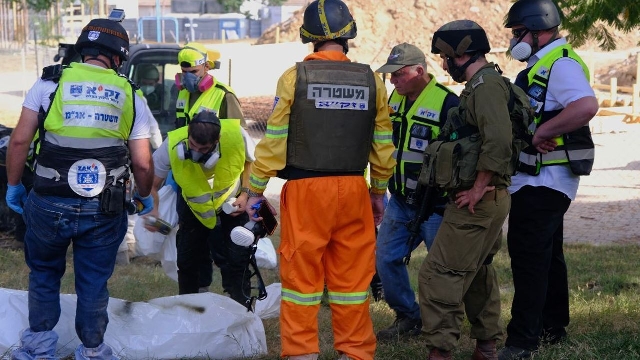 '80 per cent of bodies' were tortured
'80 per cent of bodies' were tortured
We've been travelling to the many different scenes where Hamas fighters carried out their terror attack on Israel this week, and it is becoming clear that their tactics and levels of brutality changed from location to location.
Warning - this story contains descriptions and pictures of a graphic nature
In the attack on the Nova music festival, for example, the gunmen abducted some of the partygoers, and then murdered many more, spraying them with gunfire and throwing grenades into places they were hiding.
The hiding places included toilets, dirt bins, cars, and bomb shelters.
Hundreds died at the festival.
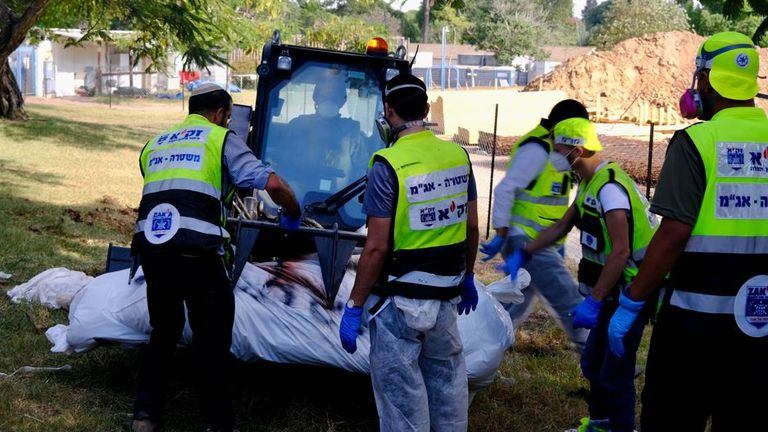 | The attackers' bodies are picked up with a forklift and put on a bulldozer
| The attackers' bodies are picked up with a forklift and put on a bulldozer
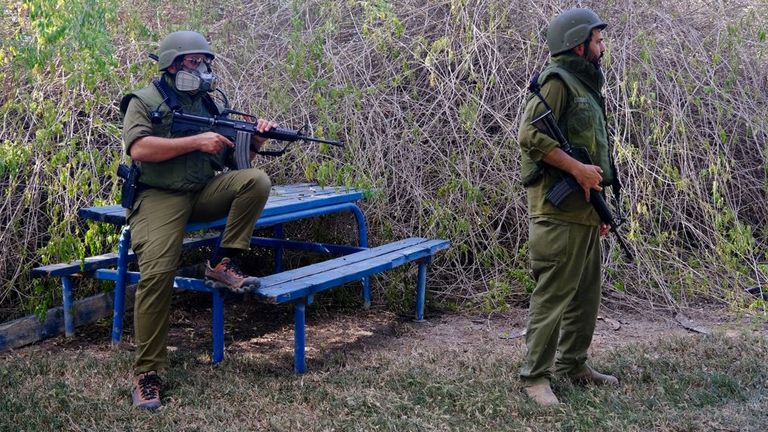 | Soldiers guard the team as they work
| Soldiers guard the team as they work
In the various kibbutzim they attacked nearby, their behaviour descended to a whole new level of depravity.
They didn't just kill - they took their time. They bound families, tortured them, and eventually murdered them.
This is something fundamentally different to the behaviours of Hamas we have seen in the past.
I've met Hamas on many occasions and interviewed their fighters.
They were always much more like a militia at war with Israel, rather than bloodthirsty killers and torturers.
Something has changed.
Bodies 'tell stories of torture'
The testimony of the people charged with recovering the dead is disturbing and difficult to listen to, but they want everyone to understand just how horrific it was.
Zaka, a volunteer civilian emergency response organisation charged with recovering the bodies here, is still finding bodies of the victims over a week later.
Yossi Landau is the boss for the southern region - he has been doing this work for 33 years all over the world.
He tells me the latest person to be found at the Kfar Aza kibbutz has been beheaded.
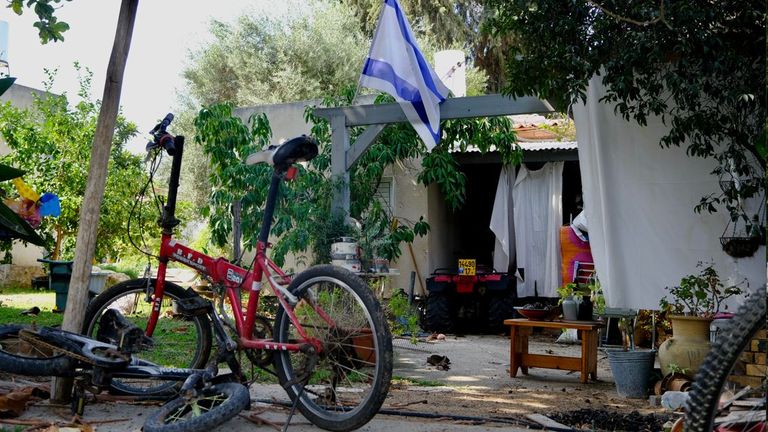 | An Israeli flag outside a house
| An Israeli flag outside a house
He says: "We thought we finished but we came back now this morning after being a week around here, and we just pulled out a body over here - no head - you know it's the worst…"
He tells me he has never seen anything like this, and that the sheer brutality of Hamas has stunned his entire team.
"We saw women with no clothes and hands tied to the back," he says. "We saw families... over here in this kibbutz I saw families with hands tied to the back, sitting parents and children, sitting one against the other, tortured.
"We could see the bodies were telling the stories.
"You know they can't talk but they were telling us their stories, they were crying together with us."
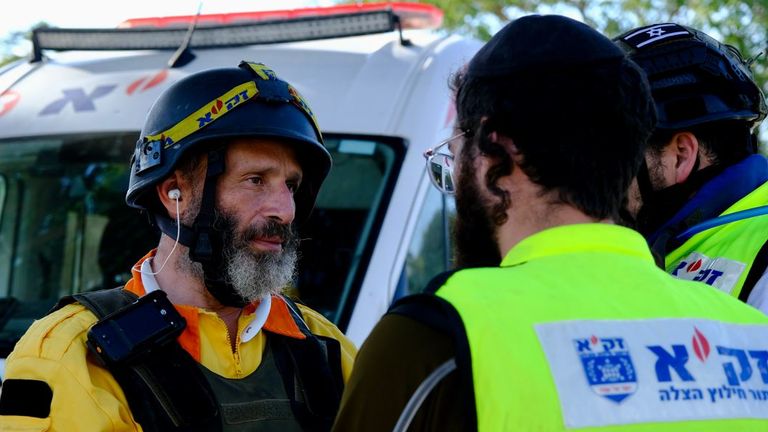 | Yossi Landau with members of Zaka
| Yossi Landau with members of Zaka
'That's a war crime'
Yossi and his team have carried out their work at all the sites of last Saturday's rampage.
He says there are noticeable differences between the way people were killed at the various locations.
"By the festival, they weren't tortured - there was no torture because everything was on a field and they had no time for doing that," he explains.
"There was no torturing, it was mass killing - like if they were hiding in a garbage can or something, they threw in a grenade to make sure everyone was killed.
"That's a war crime for itself, and most of them, I would say 70%, were shot in the back - that's a war crime."
He continued: "In Kfar Aza and Be'eri, we are talking about a total of 280 bodies, 280 casualties.
"I would say 80% were tortured, and you're talking children, adults...
"You're talking a pile, two piles - when we found them in Be'eri, two piles of 10 children each were tied to the back, burnt to death…"
He says as far as he can tell, Hamas's killers had time to do whatever they wanted.
"They had the time, nobody bothered them, they had the manpower - I wouldn't call it manpower - the butcher power…"
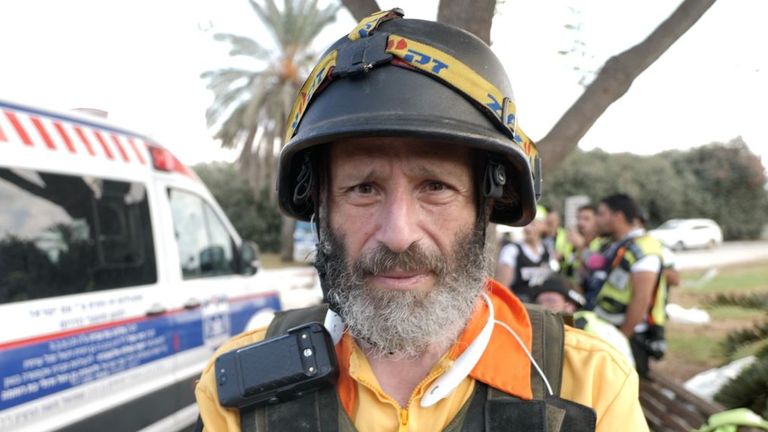 | Yossi Landau is Zaka's southern region boss
| Yossi Landau is Zaka's southern region boss
'We collect the terrorists'
When we met up with Yossi and his team, they had just been tasked with recovering the bodies of those gunmen.
We travel to one area of kibbutz Kfar Aza and are turned around - a soldier says it's too dangerous.
Yossi wants to pick up the bodies - the soldier says he can't.
They agree a digger will go forward and pick up the dead, and we take another route to another site to collect a handful of bodies.
The dead fighters are gathered together and placed in individual body bags.
Using a can of spray paint, members of Zaka then mark the bags with an X, designating that they aren't civilians but that they are the bodies of the killers.
The bodies are then scooped up from the ground with a forklift and transferred onto a bulldozer.
Zaka already knows that their teams are suffering extreme psychological stress.
Their families have been briefed to pass up the line if their loved ones are behaving abnormally, so they can get help.
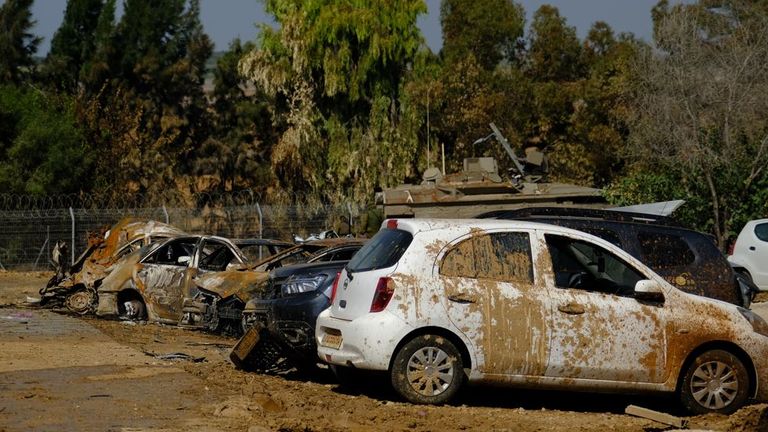 | Damaged cars near a kibbutz
| Damaged cars near a kibbutz
Yossi says humanely retrieving the very people who carried out the attack is itself "very difficult" to do because they "killed our brothers and sisters and tortured the people".
But he says it's what they do.
"We do it for the families, for the dead people, and unfortunately we do it for the terrorists too…
"We collect the terrorists, we make sure they get in body bags, they go in for identity and they're being stored, but that's not our department it goes further.
"But we have to make sure that to honour - that's our religion, to honour death and life - because everyone has a family behind them, and that's Zaka's work."
Source: news.sky.com






